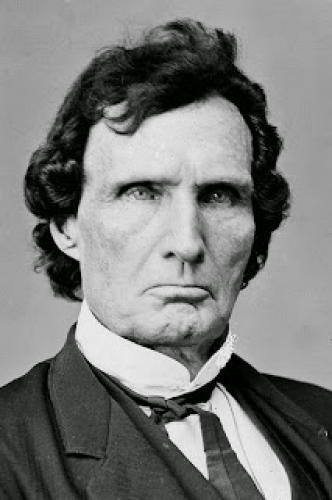
Thaddeus Stevens
.... Having failed to gain any assistance from the state legislature or relief from local courts, the German Seventh-Day Baptists of Snow Hill appealed their case to the Pennsylvania Supreme Court and gained the assistance of a well-regarded attorney with a thriving law practice in nearby Lancaster. His name was Thaddeus Stevens. Based on Stevens' later career as a Radical Republican Congressional leader and champion of racial equality during Reconstruction, it should come as no surprise that Stevens was drawn to a case involving, in the words of Sunday law critics, broad principles of equality, civil rights, human rights, minority rights, and democracy. But in the mid-1840s Stevens already had established credentials that made him a fitting advocate for the Seventh Day Baptists. Stevens was a Whig partisan, but he was also independent minded and had a reputation for passionately embracing more radical causes. In addition to being a renowned champion of free public education, he was also a critic of capital punishment, a defender of fugitive slaves, an advocate for black suffrage rights, and an opponent of slavery's westward expansion. Defending the Snow Hill Society from Sunday law prosecutions fit within these broader commitments to social equality and working on behalf of the oppressed.
The Pennsylvania Supreme Court postponed argument in the Snow Hill case more than once, but when "Specht v. Commonwealth" was finally argued in 1848, Thaddeus Stevens's argument provided a capstone to many of the arguments diverse groups had "are founded on no religion, but on purely civil considerations - on the inalienable rights of man; one of which is "that man shall not interfere with the rights of conscience." Sunday laws repudiated the traditions of the American founding. Stevens also preempted the argument that the Sunday law was justified because the "'Christian religion is a part of the common law.'" Influential nineteenth-century jurists like James Kent and Joseph Story repeated this phrase, and Sunday law supporters also had made this argument. But to Stevens it was a "dangerous" doctrine that had been used for centuries to enable "tyrants. More blood has been shed by the familiars of the Holy Inquisition," he stressed, "than was ever offered a sacrifice to their hideous deities on Pagan altars." The "fathers of the Revolution" knew this and "took care that our government should be wholly disconnected with all religions."
Stevens concluded by pleading that the "independent Judiciary" defend "religious liberty." It was "no answer," he stressed, "to say that a majority of the Legislature can repeal it." It was "the great glory of written, paramount constitutions...that they protect minorities against the will of majorities." Sunday laws were the tool of majorities and it was the precise role of the judiciary to defend minorities when the bounds of constitutional authority were exceeded. The Court needed to "stand by the constitution, and interpose their protecting shield between the "many" and the "few". If they fail to do this out of respect to a majority, that sovereign of Republics, history will rank them with Scroggs, and Impey and Rich, who sacrificed the rights of conscience and of humanity to please "their" sovereigns." Not to put too fine a point on it. Stevens reminded the Court that "It was the same influence-the voice of the PEOPLE, crying 'crucify him! crucify him!' that bore down the judgment of Pilate, and made him the judicial murderer of HIM, who suffered for conscience's sake. When the temples of Justice cease to be a refuge for the oppressed, there will be none left for them on earth." Unlike Pilate, the Pennsylvania Supreme Court needed to ignore the popular "majorities forgetful of the true principles of our government." It needed to defend the "civil and religious liberty" of minorities.....Unfortunately the Pennsylvania Supreme Court upheld the Sunday blue laws.


















